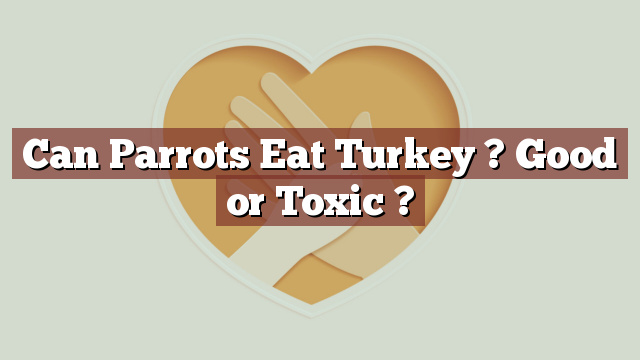Can Parrots Eat Turkey? Good or Toxic?
Parrots are delightful and intelligent birds that require a balanced diet to maintain their health and well-being. As responsible parrot owners, it is crucial to understand what foods are safe for our feathered friends and which ones may pose a risk to their health. In this article, we will explore whether parrots can consume turkey, and if so, whether it is good or toxic for them.
Nutritional Value of Turkey for Parrots
Turkey is a popular protein source for humans, and it does offer certain nutritional benefits. It is a lean meat that is low in fat and contains essential amino acids that contribute to muscle growth and repair. Additionally, turkey contains vitamins B6 and B12, which aid in metabolism and the production of red blood cells.
However, when considering the nutritional value of turkey specifically for parrots, it is essential to note that these birds have unique dietary requirements. Parrots require a diet that consists mainly of fruits, vegetables, and high-quality pellets designed specifically for their needs. While turkey does provide protein, it does not offer the same variety of nutrients that parrots need for optimal health. Therefore, turkey should not be a staple food in a parrot’s diet.
Safety of Turkey for Parrots: Good or Toxic?
Parrots can eat turkey, but it is important to exercise caution and moderation. The meat itself is not toxic to parrots, but certain factors need to be considered. Firstly, the turkey should be cooked thoroughly without any seasoning or additives. Seasonings, such as garlic, onion, or salt, can be harmful to parrots. Additionally, the skin of the turkey should be removed as it is high in fat and can be difficult for parrots to digest.
It is important to source organic, free-range turkey whenever possible, as conventionally raised turkeys may contain antibiotics or other additives that could be harmful to parrots. Furthermore, it is crucial to remove any bones from the turkey before offering it to your parrot. Bones can pose a choking hazard and may splinter, causing internal injuries.
Potential Risks and Benefits of Feeding Turkey to Parrots
Feeding turkey to parrots in moderation can have some benefits. As mentioned earlier, turkey is a good source of lean protein, which can be beneficial for parrots. It can be offered as an occasional treat or as part of a varied diet that includes a wide range of fruits, vegetables, and pellets specifically formulated for parrots.
However, there are also potential risks associated with feeding turkey to parrots. The high-fat content in turkey skin can contribute to obesity in parrots if consumed regularly. Additionally, if the turkey is not cooked properly or contains seasonings, it can lead to digestive issues or adverse reactions in parrots.
What to Do if Your Parrot Eats Turkey
If your parrot accidentally consumes turkey that has been seasoned or cooked with additives, it is essential to monitor them closely for any signs of illness. Symptoms such as vomiting, diarrhea, or changes in behavior should not be taken lightly, and immediate veterinary attention should be sought if any concerns arise. It is always better to be safe than sorry when it comes to your parrot’s health.
Conclusion: Guidelines for Feeding Turkey to Parrots
In conclusion, parrots can eat turkey, but it should not be a significant component of their diet. Turkey should be offered in moderation and prepared without any seasoning or additives. The skin and bones must be removed to avoid potential health risks. Remember, a balanced diet consisting of fruits, vegetables, and high-quality pellets formulated for parrots is crucial for their overall well-being. If you have any concerns or questions about your parrot’s diet, it is advisable to consult with a veterinarian who specializes in avian care.
Thank you for investing your time in exploring [page_title] on Can-Eat.org. Our goal is to provide readers like you with thorough and reliable information about various dietary topics. Each article, including [page_title], stems from diligent research and a passion for understanding the nuances of our food choices. We believe that knowledge is a vital step towards making informed and healthy decisions. However, while "[page_title]" sheds light on its specific topic, it's crucial to remember that everyone's body reacts differently to foods and dietary changes. What might be beneficial for one person could have different effects on another. Before you consider integrating suggestions or insights from "[page_title]" into your diet, it's always wise to consult with a nutritionist or healthcare professional. Their specialized knowledge ensures that you're making choices best suited to your individual health needs. As you navigate [page_title], be mindful of potential allergies, intolerances, or unique dietary requirements you may have. No singular article can capture the vast diversity of human health, and individualized guidance is invaluable. The content provided in [page_title] serves as a general guide. It is not, by any means, a substitute for personalized medical or nutritional advice. Your health should always be the top priority, and professional guidance is the best path forward. In your journey towards a balanced and nutritious lifestyle, we hope that [page_title] serves as a helpful stepping stone. Remember, informed decisions lead to healthier outcomes. Thank you for trusting Can-Eat.org. Continue exploring, learning, and prioritizing your health. Cheers to a well-informed and healthier future!

